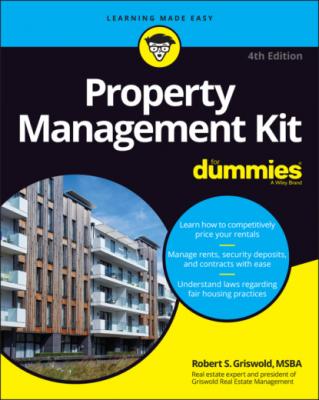Property Management Kit For Dummies. Robert S. Griswold
Чтение книги онлайн.
Читать онлайн книгу Property Management Kit For Dummies - Robert S. Griswold страница 28
 than the previous owner’s, you may find the transition period to be difficult. For a single-family rental or a small rental property, implementing your own rental agreement as soon as legally allowed is relatively easy. For a larger rental property, you may want to transition to a new contract gradually upon tenant turnover. Regardless, establish uniform policies for all your tenants to avoid any possible fair-housing violations. (Find out more about fair-housing laws in Chapter 11.)
than the previous owner’s, you may find the transition period to be difficult. For a single-family rental or a small rental property, implementing your own rental agreement as soon as legally allowed is relatively easy. For a larger rental property, you may want to transition to a new contract gradually upon tenant turnover. Regardless, establish uniform policies for all your tenants to avoid any possible fair-housing violations. (Find out more about fair-housing laws in Chapter 11.)
Your tenants already have one of the following:
A valid written lease
An expired written lease that has become a month-to-month rental agreement
A written month-to-month rental agreement
A written rental agreement for a period of less than a month
A verbal agreement
Your ability to implement your own lease or rental agreement will be affected by which agreement is currently in force with any existing tenants. You have to honor a written lease until it expires. If your tenant has an expired lease that is now a month-to-month rental agreement, or they are already on a month-to-month rental agreement, you can transfer your tenant to a new rental contract upon 30 days’ written notice. A verbal agreement can be changed at any time.
The tenant information the seller provided you during escrow may be outdated. One quick way to update your records is to have the tenants voluntarily complete your rental application form. In many states, you may not have a strong legal argument for requiring existing tenants to provide this information, but many tenants will understand your reasoning and not mind. Other tenants may be reluctant to complete a new rental application. Even if you receive initial resistance, seek this updated information before renewing any lease. You need to be able to determine the financial qualifications of your tenants, particularly if you anticipate future rent increases.
Evaluating the current rent
When you acquire a rental property, part of your research is to establish its market rental value. This accurate calculation should play a role in your decision to buy. If a tenant’s current rent is below market value, one of your toughest decisions is how to handle rent increases. If you are in an area that has rent control, you may find that you are unable to increase the rent at all, or that you can do so only over many years until you can get close to the market value. You also need to know whether there is vacancy decontrol, which allows the landlord to raise the rent by some amount or even up to full market rent at the beginning of a new tenancy.
As the new owner, you often have higher mortgage payments and expenses (such as necessary repairs and upgrades to the property) than the last owner did. Some tenants get very upset and antagonistic about any rent increase, however, and you won’t be able to appease them. If tenants simply can’t afford an increase, work with them, and give them ample time to relocate if necessary. Other tenants welcome the improvements that accompany the purchase of their building by a new owner and will accept the rent increase.
You don’t raise the rent beyond the current market rent for a comparable rental unit in the area or beyond any legal limits. Give tenants documented information on comparable rentals in your area to show them that you’re not asking for unreasonable rent.
You’re willing to make basic repairs to the rental units. Don’t ask tenants to shell out extra cash without proving that you’re committed to maintaining and even improving the property. But tenants don’t appreciate all improvements equally. A new roof may not mean much if a unit didn’t leak, but a new boiler or water heater could mean better water pressure or more consistent hot water, which all tenants will notice.
Most tenants just want to be sure they’re receiving some of the benefits of paying higher rent. If you ask for more rent, be willing to reinvest a portion of the rent increase in the property with cost-effective improvements that conserve energy and/or increase tenant desirability.
Part 2
Renting Your Property
IN THIS PART …
Understand the process of renting your residential property.
Get your rental unit ready for tenants.
Set the rent, and evaluate marketing and advertising options.
Show your property to prospective tenants.
Develop good tenant-screening policies.
Chapter 5
Getting Your Residential Rental Property Ready for Prospective Tenants
IN THIS CHAPTER